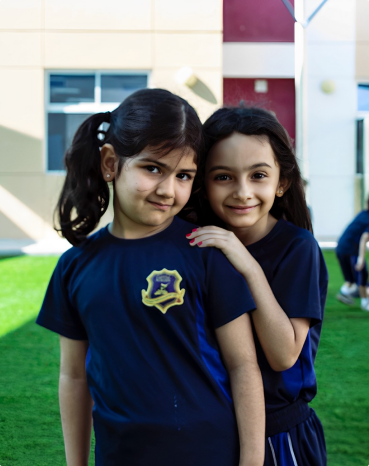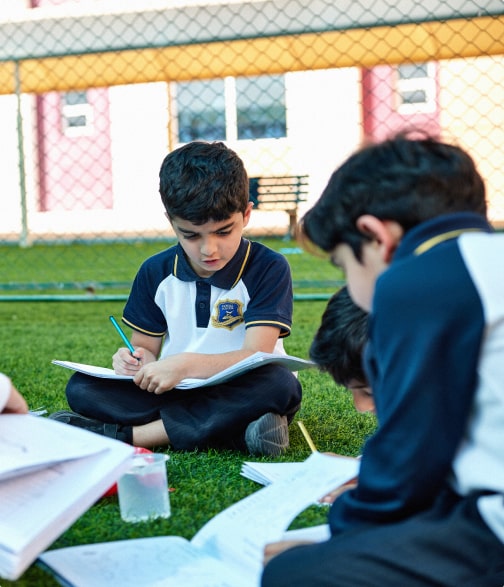Whole-School Curriculum Intent
At Capital School, our curriculum is designed to reflect the values and aspirations of our school community, rooted in the principles of the English National Curriculum and adapted to our unique context in the Middle East. We aim to provide a rich, inclusive, and ambitious education that nurtures happy, creative, and confident learners, preparing them to thrive as responsible global citizens.
Our Intentions
To Inspire Lifelong Learning
We foster curiosity, creativity, and a love of learning across all subjects, encouraging students to become independent thinkers and resilient individuals.
To Promote Academic Excellence
Through high-quality teaching and learning, we ensure that every student is supported and challenged to achieve their full potential.
To Build an Inclusive and Supportive Community
We celebrate diversity and promote equity, ensuring that all learners feel valued and empowered.
To Prepare Responsible Global Citizens
We equip students with the knowledge, skills, and values needed to navigate and contribute positively to an interconnected world.
Contextual Relevance
Operating in the Middle East, our curriculum is sensitive to local customs and values while maintaining the rigor and expectations of the UK education system.
We integrate opportunities for students to explore regional history, language, and culture, fostering mutual respect and global understanding.

Arabic
Arabic is one of the oldest existing and most widely spoken languages in the world and is ranked as one of the world's major languages since it is the language for the Muslim religion.
At Capital School, we are proud of our Arabic language studies for both native and non-native speakers in order for all our pupils to embrace their life in Bahrain. We follow the Ministry of Education Arabic curriculum, which focuses on reading, writing, speaking and listening. The curriculum is enhanced through units of work linked to learning about Bahrain and Arabic Heritage and Culture in Social Studies and Citizenship lessons.
We celebrate Arabic language and culture on many occasions as a whole school such as for Bahrain National Day, Eid al Adha and an Arabic Reading and Writing Week.
Art
Our Art curriculum follows the Art Programmes of Study in the National Curriculum for England 2014. This ensures that all pupils have ample opportunities to produce creative work, exploring their ideas and recording their experiences in a variety of media. Pupils become proficient in drawing, painting, sculpture and other art, craft and design techniques.
The curriculum is enhanced by exploring the work of famous artists, Arabic art and through opportunities to visit local artists at work.
English
English at primary school level is the ability to read, write, speak and listen in a way that lets us communicate effectively and make sense of the world. At Capital School we aim to equip our pupils with the best English skills, attitudes and habits, in order for them to reach their future goals.
We do this through the teaching of specific skills:
- Reading
- Writing
- Speaking and listening
These skills are fundamental to success both in school and in later life, as we set our children up to be effective citizens of the future. The skills are taught both in a discrete manner as separate elements of the curriculum, but also are fully entwined for immersive teaching in English.
We provide learning support lessons for pupils who have weaker English language skills in order that they can fully access all areas of our curriculum.
At Secondary level we extend these learned skills to develop an understanding of literature, as well as developing pupils’ appreciation of the significance of language in society. The English curriculum at this level aims to develop imaginative, convincing, compelling and sophisticated writing that is adapted for different audiences and purposes.
Humanities
Geography teaching in KS1 and KS2 follows the Geography Programmes of Study in the English National Curriculum. This ensures that all pupils have knowledge about diverse places, people, resources and natural and human environments, together with a deep understanding of the Earth’s key physical and human processes.
History teaching in KS1 and KS2 follows the History Programmes of Study in the English National Curriculum. History helps pupils to gain a coherent knowledge and understanding of Britain’s past and that of the wider world, including Bahrain. History is taught by the pupil’s class teacher.
ICT
Our pupils receive high-quality ICT teaching, preparing them to use computational thinking and creativity to understand and change the world. Each year group follows an ICT curriculum based on the UK National Curriculum for Computer Science. We actively encourage our pupils to become responsible, independent IT users and endeavour to ensure our wider curriculum incorporates elements of computer technology.
All our classrooms are equipped with either an interactive whiteboard or an interactive projector. We also have three ICT classrooms for pupils to have hands-on lessons with specialist teachers.
Islamic Studies
The focus of the Islamic Studies curriculum is to familiarise the pupils with Islamic beliefs and practices and to enhance their understanding of the practical dimension of their faith.
At Capital school we use the Bahrain Ministry of Education curriculum of Islamic Studies for Arabs. For non-Arab students, we use a curriculum which is specifically designed for non-Arab Muslim pupils.
Maths
At Capital School we strive to create a love of maths through interactive lessons using a variety of teaching and learning strategies and approaches. We use the very successful White Rose maths scheme to promote the mastery of maths through both deepening and broadening mathematical understanding. This scheme nurtures mathematical independence, allowing time for thinking and encouraging discussion using reasoning and problem-solving skills. TTRockstars forms one part of our mental maths strategy to help children be mentally agile and enthused about number facts.
As pupils progress through to the secondary stage, they are further developed as independent, confident and determined mathematicians. They are provided with opportunities to ask their own questions, create their own solutions, think deeply and refine their ideas through both individual and collaborative work.
Modern Foreign Languages
The French curriculum is based on the British National curriculum programme of study for MFL. Non-native Arab children from year 3 upwards are given the opportunity to extend their language skills to a second foreign language with 3 hours of tuition in French per week.
The emphasis is on communication in a fun and stimulating learning environment. French lessons include songs, games, role-play, learning about French culture, writing projects, and activities online. The French curriculum is enhanced through activities such as Languages Day.
Native Arab speakers can currently learn French in primary school through extracurricular clubs.
In Secondary school, all pupils currently learn Spanish as a new foreign language. French continues at an advanced level for all pupils who learned the language in the primary section.
Music
The Music Curriculum inspires our pupils to develop a love of music and talent as musicians. Pupils participate in a range of musical activities, including practical and theoretical tasks, which involve singing, composing, listening and performing.
In the junior section of the school, all pupils will learn to play an instrument. As they become older and have the theoretical knowledge to do so, we encourage pupils to continue with music lessons through individual tuition and extracurricular musical activities such as choir and orchestras.
Physical Education
We use the fundamentals of the English Physical Education curriculum as this provides opportunities for pupils to become physically confident in a way which supports their health and fitness. PE opportunities at Capital School build character and help to embed values such as fairness and respect. The PE curriculum is tailored to improve psychological health, supporting cognitive and academic performance.
All PE teaching at Capital School is undertaken by specialist PE teachers.
Science
The aim of our junior science curriculum is to ensure that all pupils develop scientific knowledge and conceptual understanding through fun and exciting practical investigations. Practical science is all about ‘learning by doing’.
Science is taught by the pupil’s class teacher in Nursery to Year 6, with the support of the subject specialists. All year groups have the opportunity to use our purpose-built science laboratories.
In the secondary school, all science teaching is undertaken by subject specialist teachers only. Science in secondary level is split into biology, physics and chemistry subjects in one of our well-equipped science laboratories.
